Zentrum für interdisziplinäre Forschung (ZiF)
Veranstaltungen an diesem veranstaltungsort
-
-

Filmscreening: Volcano Voices
Zentrum für interdisziplinäre Forschung (ZiF)A Film by Clive Oppenheimer and Ulf Büntgen (Cambridge) In German and English, with subtitles Producer: Wolfgang Meschede Narrator: Werner Herzog Volcanologist Clive Oppenheimer leads a journey through time and ideas, where scientists and artists come together - united by curiosity and the joy of collaboration - to explore how volcanic eruptions changed climate and […]
-
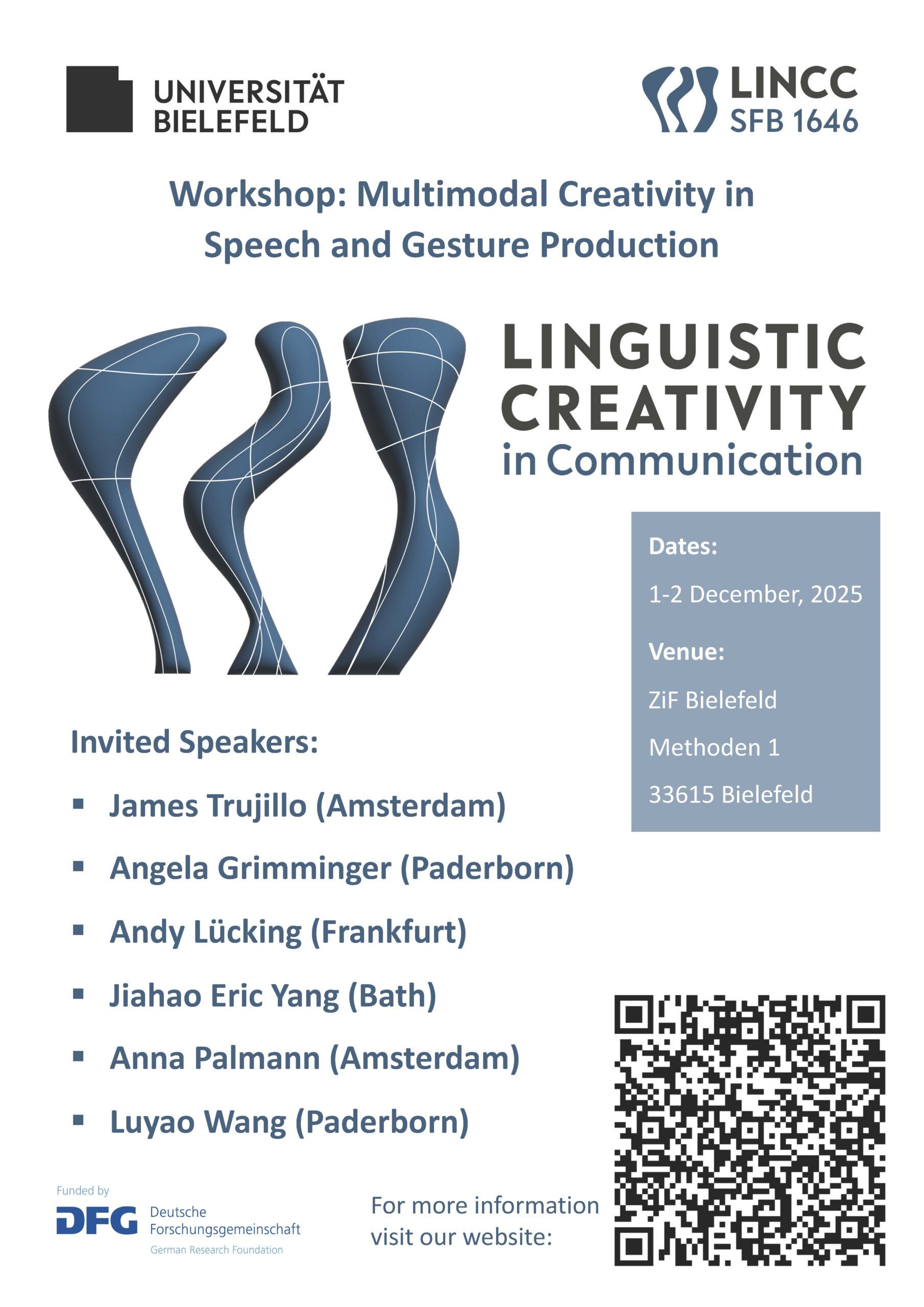
Multimodal Creativity in Speech and Gesture Production
Zentrum für interdisziplinäre Forschung (ZiF)The workshop is organized by CRC 1646 Project C02. Its broad topic is how humans employ speech and gesture creatively in communicative challenging situations, e.g., when conventionalized or commonly used communicative resources are insufficient. The workshop will address empirical, conceptual as well as computational modelling challenges surrounding this question. Invited Speakers: James Trujillo (University of Amsterdam) Angela Grimminger […]
-

Multimodal Creativity in Speech and Gesture Production
Zentrum für interdisziplinäre Forschung (ZiF)The workshop is organized by CRC 1646 Project C02. Its broad topic is how humans employ speech and gesture creatively in communicative challenging situations, e.g., when conventionalized or commonly used communicative resources are insufficient. The workshop will address empirical, conceptual as well as computational modelling challenges surrounding this question. Invited Speakers: James Trujillo (University of Amsterdam) Angela Grimminger […]
-
-
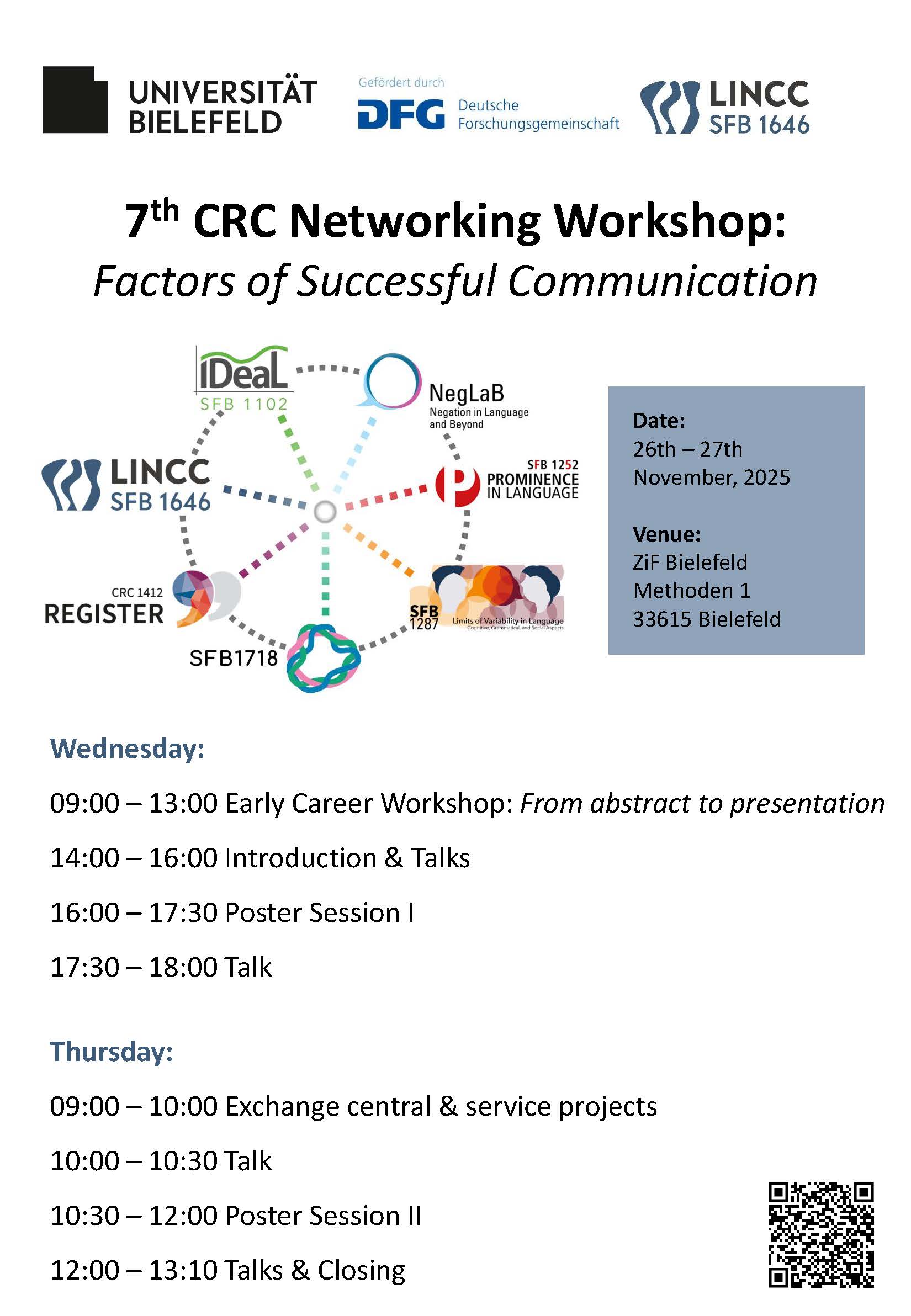
7th CRC Networking Workshop: Factors of Sucessful Communication
Zentrum für interdisziplinäre Forschung (ZiF)The Inter-CRC-Meeting for 2025, along with a special Early Career Researcher Workshop, is highlighting "Factors of Successful Communication". This networking event brings together linguistic CRCs from Berlin, Bielefeld, Frankfurt, Cologne, Potsdam, Saarbrücken, and Tübingen.
-

Pazifismus versus Wehrhaftigkeit
Zentrum für interdisziplinäre Forschung (ZiF)Podiumsdiskussion mit Joachim Krause (Kiel) und Olaf Müller (Berlin). Moderation: Véronique Zanetti (Bielefeld) Veranstaltet vom Verein der Freunde und Förderer des ZiF. Der russische Angriffskrieg gegen die Ukraine und die Neuordnung der internationalen Machtverhältnisse haben die europäischen Länder – allen voran Deutschland – dazu veranlasst, ihre militärische Verteidigungsfähigkeit auszubauen. In der Regierungsbefragung im Bundestag betonte […]
-
-
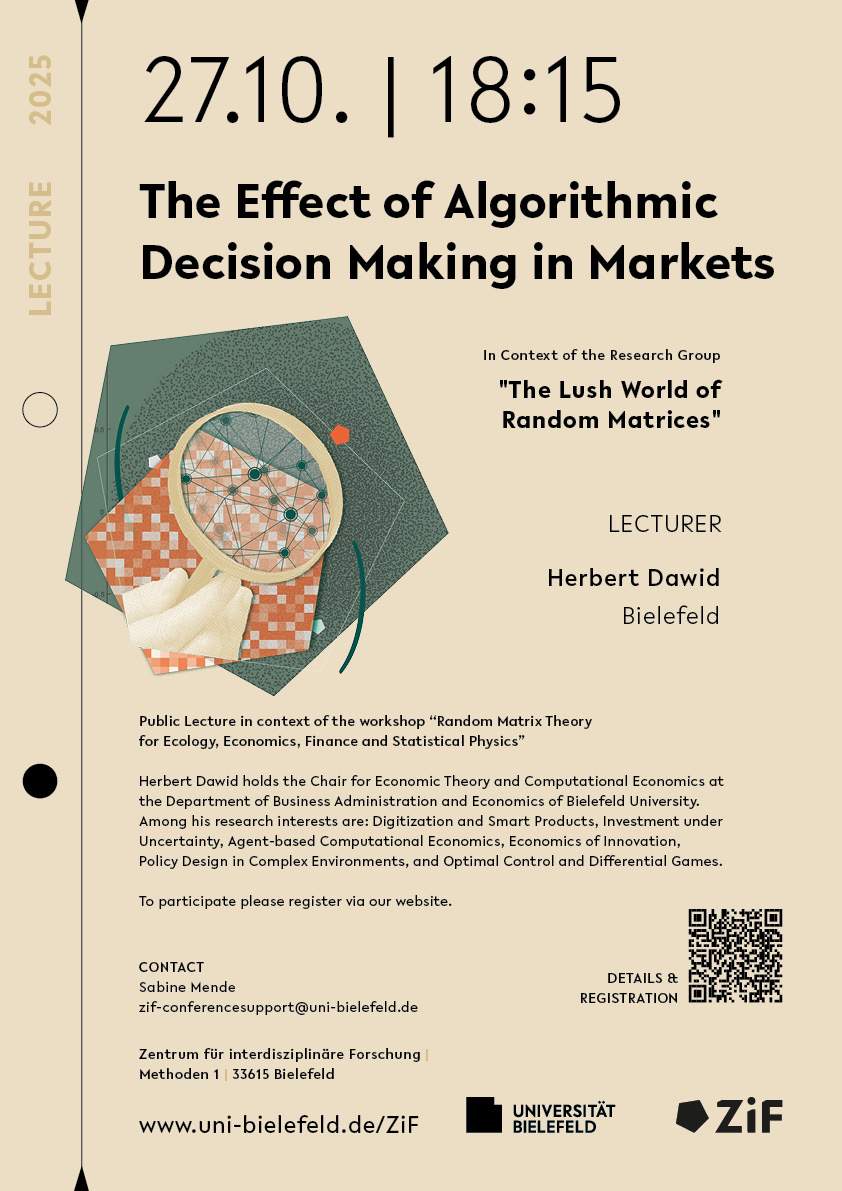
Herbert Dawid (Bielefeld): The Effect of Algorithmic Decision Making in Markets
Zentrum für interdisziplinäre Forschung (ZiF)Public Lecture in the context of the workshop "Random Matrix Theory for Ecology, Economics, Finance and Statistical Physics" Herbert Dawid holds the Chair for Economic Theory and Computational Economics at the Department of Business Administration and Economics of Bielefeld University. Among his research interests are: Digitization and Smart Products, Investment under Uncertainty, Agent-based Computational Economics, […]
-
Inaugural Conference of the Institute for Studies of Science (ISoS)
Zentrum für interdisziplinäre Forschung (ZiF)We are delighted to celebrate the founding of the Institute for Studies of Science (ISoS) as a Central Academic Institute at Bielefeld University. Our inaugural conference, “Science in Practice and in Society”, will be held at the Center for Interdisciplinary Research (ZiF) in Bielefeld on October 24, 2025. The Institute for Studies of Science (ISoS) has […]
-
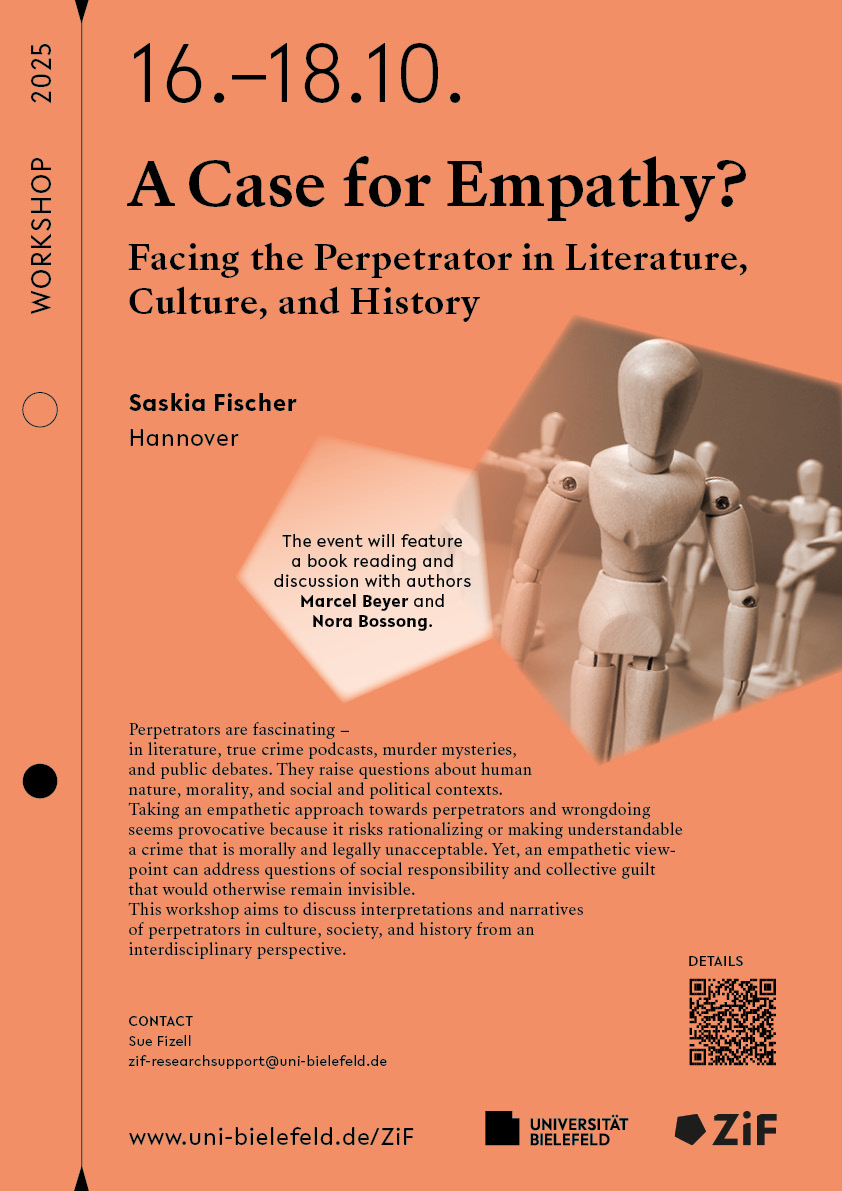
A Case for Empathy?
Zentrum für interdisziplinäre Forschung (ZiF)Perpetrators are fascinating — in literature, true crime podcasts, murder mysteries, and public debates. They raise questions about human nature, morality, and social and political contexts. However, they also often serve as convenient figures for society to project evil onto “the other.” Taking an empathetic approach toward perpetrators and wrongdoing seems provocative because it risks […]
-
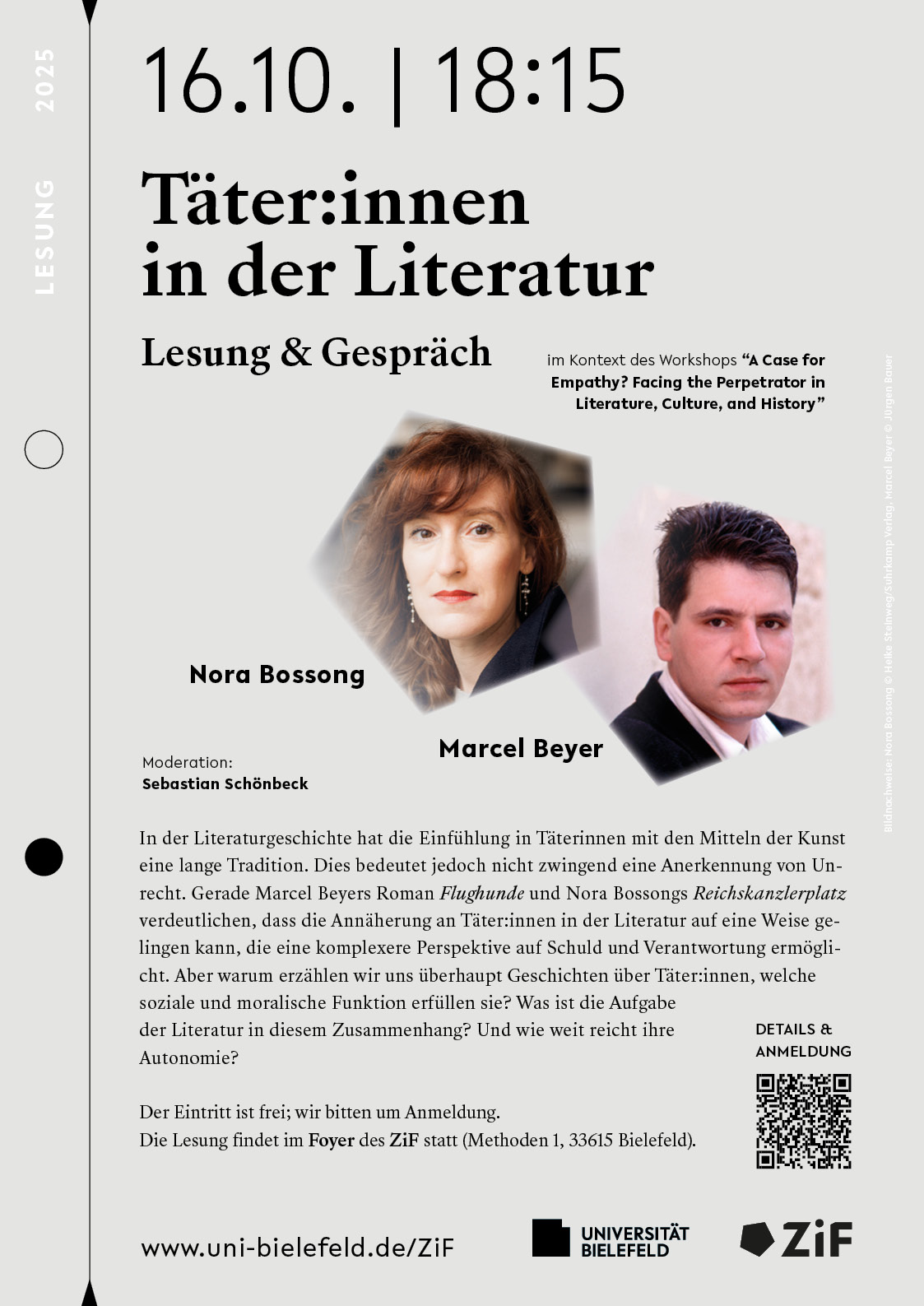
Täter:innen in der Literatur
Zentrum für interdisziplinäre Forschung (ZiF)In der Literaturgeschichte hat die Einfühlung in Täter:innen mit den Mitteln der Kunst eine lange Tradition. Dies bedeutet jedoch nicht, dass die literarische Auseinandersetzung mit Täter:innen zwingend zur Anerkennung von Unrecht, Entschuldigung, Entlastung oder gar zu einer Täter-Opfer-Umkehr führen muss. Gerade Marcel Beyers Roman Flughunde über die Familie des NS-Propagandaministers Goebbels und Nora Bossongs Reichskanzlerplatz, […]
-
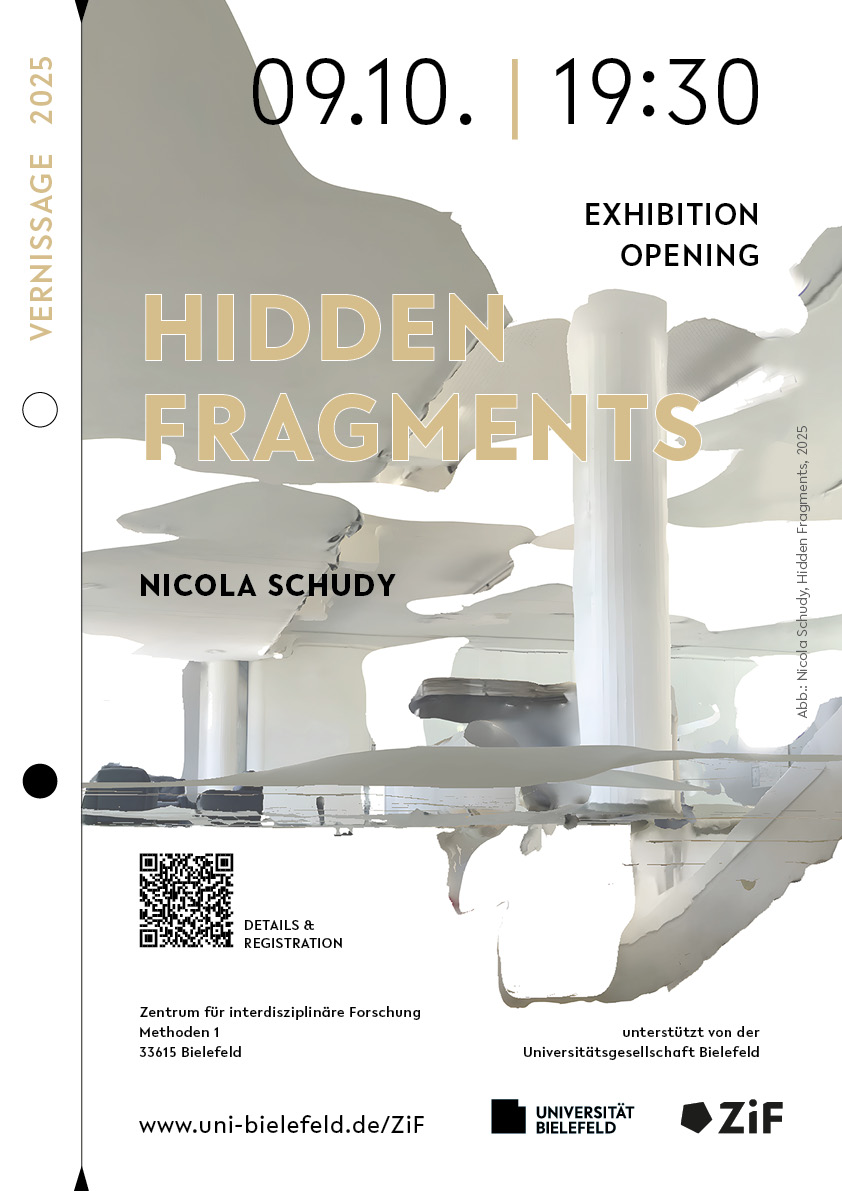
Hidden Fragments
Zentrum für interdisziplinäre Forschung (ZiF)Nicola Schudy beschäftigt sich mit der künstlerischen Analyse von Orten und Räumen und kommentiert sie in Form von raumgreifenden Installationen. Sie spürt der Geschichte, der Atmosphäre und der Formgebung nach und macht Brüche und Hintergründiges sichtbar. Häufig stehen Konstruktion und Dekonstruktion in ihren Arbeiten dicht nebeneinander. Ein weiterer Strang ihrer Arbeit ist die Zusammenarbeit mit […]
Kostenlos -
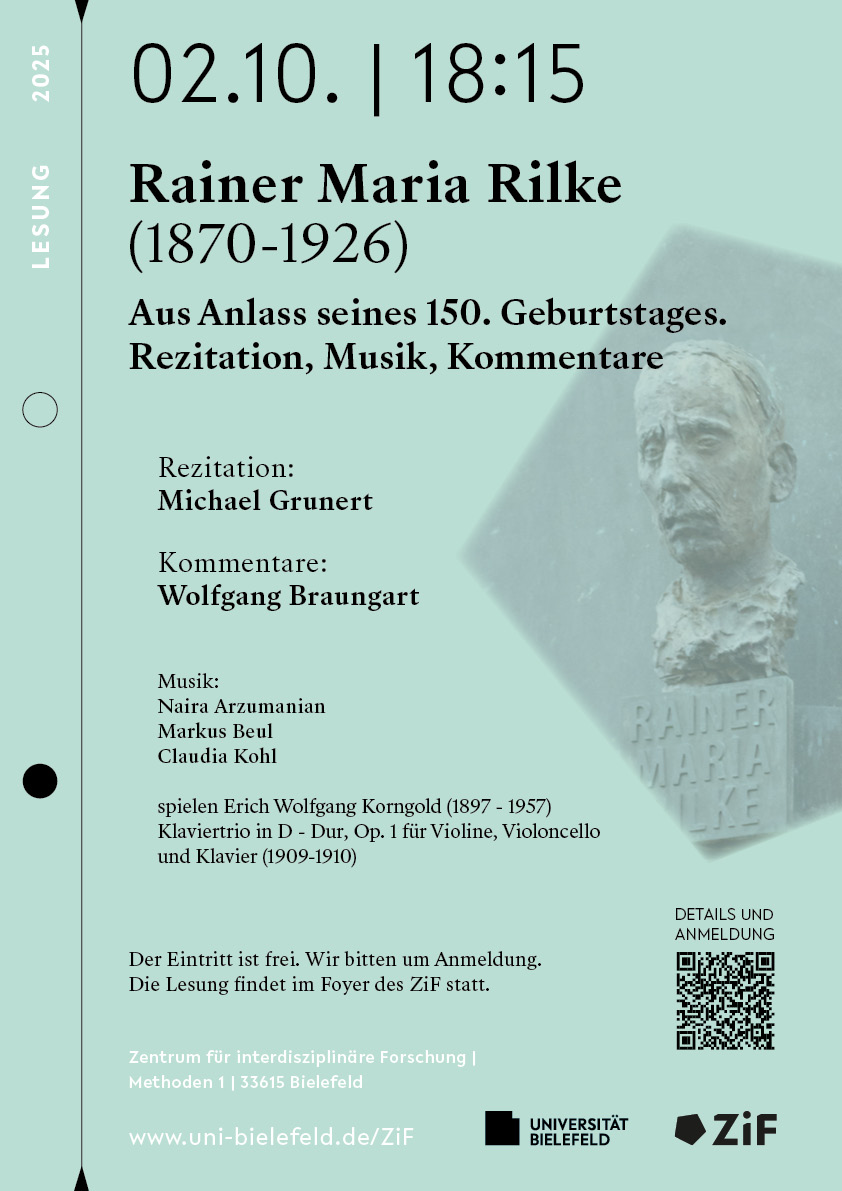
Rainer Maria Rilke (1870-1926)
Zentrum für interdisziplinäre Forschung (ZiF)2025 jährt sich der Geburtstag des Dichters Rainer Maria Rilke zum 150. Mal. Seine Gedichte sind seit der Zeit um 1900 nie aus dem öffentlichen Bewusstsein verschwunden; einige davon sind geradezu populär geworden und es bis heute geblieben. Der Schauspieler Michael Grunert wird Beispiele aus dem gesamten Werk rezitieren; der Literaturwissenschaftler Wolfgang Braungart gibt kurze […]
Kostenlos -

Rainer Maria Rilke (1870-1926)
Zentrum für interdisziplinäre Forschung (ZiF)Leitung: Wolfgang Braungart, Véronique Zanetti (Bielefeld) mit: Naira Arzumanian, Violine Markus Beul, Violoncello Claudia Kohl, Klavier Michael Grunert, Rezitation Wolfgang Braungart, Moderation und Kommentar 2025 jährt sich der Geburtstag des Dichters Rainer Maria Rilke zum 150. Mal. Seine Gedichte sind seit der Zeit um 1900 nie aus dem öffentlichen Bewusstsein verschwunden; einige davon sind geradezu […]
-
-

Cultural Ways of Dealing with Conflicts
Zentrum für interdisziplinäre Forschung (ZiF)We live in times of multiple crises and uncertainties, at least that is the tenor of current political and scientific discourse. These discursive crisis scenarios are sometimes contrasted with futures that address cultures of cohesion and community. Although such approaches offer orientation, they are not sufficient to adequately understand the cultural dimensions of current crisis […]
-

AI Risk and Safety Landscape
Zentrum für interdisziplinäre Forschung (ZiF)With the increasing adoption of artificial intelligence (AI) methods in society, discussions about associated risks and how to mitigate them have also intensified, as evidenced by efforts to regulate AI applications in the EU and industry attempts to provide “safe AI”. However, while there appears to be a general consensus that AI-supported systems ought to […]
-
-
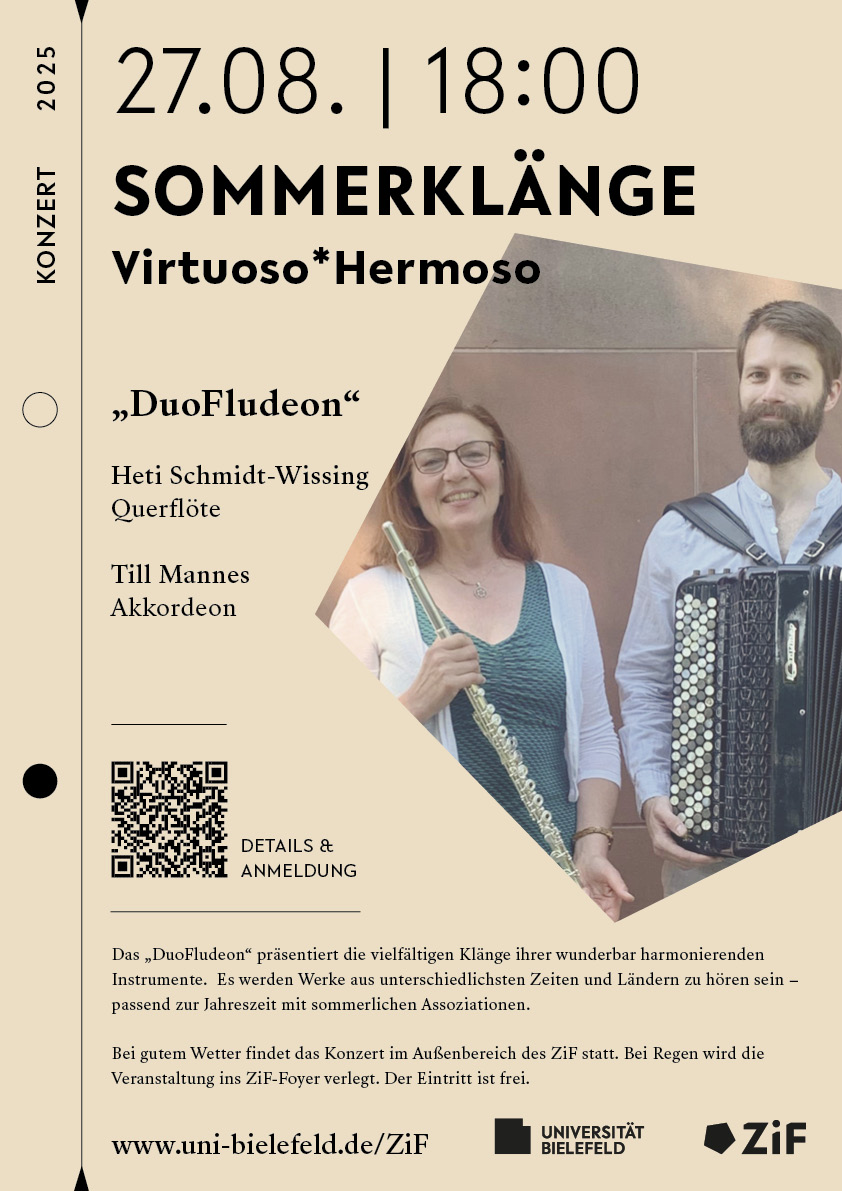
Virtuoso*Hermoso – Sommerklänge
Zentrum für interdisziplinäre Forschung (ZiF)Heti Schmidt-Wissing (Querflöte) und Till Mannes (Akkordeon) haben sich 2022 an der Musik und Kunstschule Bielefeld kennengelernt und entdecken seitdem gemeinsam die vielfältigen Klänge ihrer wunderbar harmonierenden Instrumente. Das “DuoFludeon“ wurde geboren. Mittlerweile sind aus eigener Hand zahlreiche Arrangements in ihrer Besetzung entstanden. Das Programm dieses Konzertes orientiert sich an der Jahreszeit und so laden […]
Kostenlos -
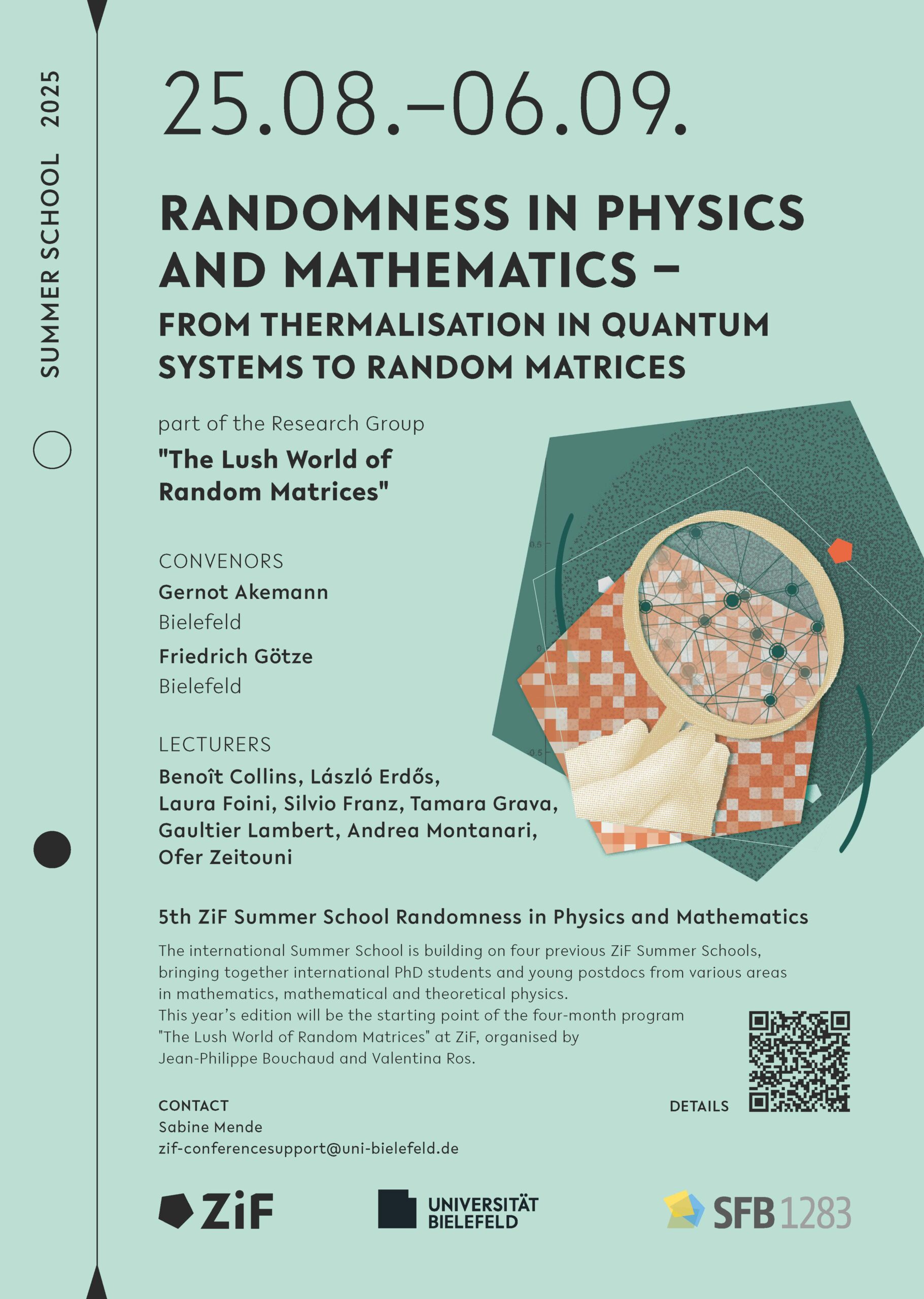
Summer School on Randomness in Physics and Mathematics
Zentrum für interdisziplinäre Forschung (ZiF)The international Summer School is building on four previous ZiF Summer Schools, bringing together international PhD students and young postdocs from various areas in mathematics, mathematical and theoretical physics. This year’s edition will be the starting point of the four-month program “The Lush World of Random Matrices” at the Center for Interdisciplinary Research (ZiF), organised […]
-
-
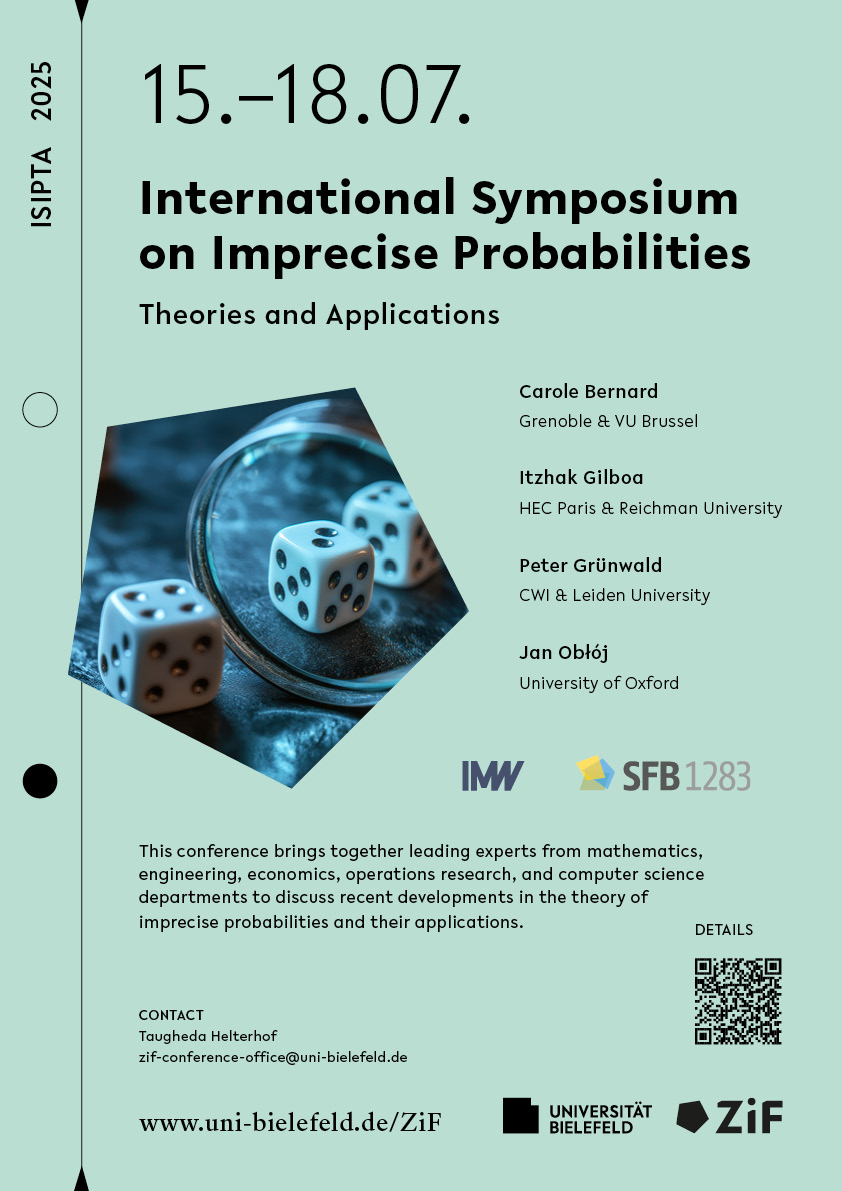
ISIPTA 2025: International Symposium on Imprecise Probabilities
Zentrum für interdisziplinäre Forschung (ZiF)Convenors: Jasper De Bock (Gent), Max Nendel (Bielefeld), Frank Riedel (Bielefeld) ISIPTA is the leading international forum for theories and applications of imprecise probabilities. This workshop brings together leading experts from mathematics, engineering, economics, operations research, and computer science departments to discuss recent developments in the theory of imprecise probabilities and their applications to engineering, […]
-
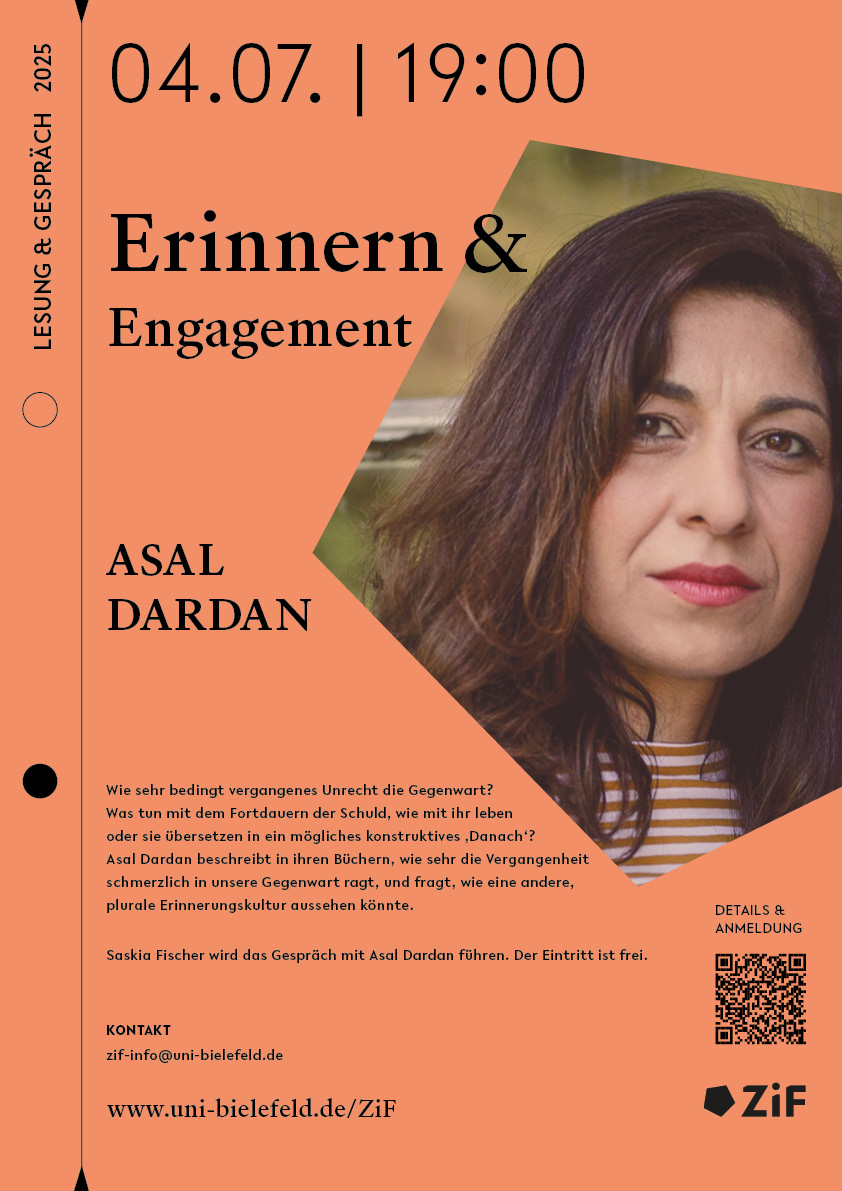
Asal Dardan: Erinnern und Engagement
Zentrum für interdisziplinäre Forschung (ZiF)Wie sehr bedingt vergangenes Unrecht die Gegenwart? Was tun mit dem Fortdauern der Schuld, wie mit ihr leben oder sie übersetzen in ein mögliches konstruktives ‚Danach‘? Kann dies überhaupt gelingen und wer trägt die Verantwortung? Asal Dardan beschreibt in ihrem neuesten Buch Traumaland (2025) differenziert und umfassend, wie sehr die Vergangenheit schmerzlich in unsere Gegenwart […]
-
-
More than Luck
Zentrum für interdisziplinäre Forschung (ZiF)Convenor: Rima-Maria Rahal (Heidelberg/Bonn) Almost half of research expenditure in Germany is financed through third-party funding. Usually, these funds are awarded in competitive procedures to which researchers submit applications. The aim is to identify and fund the best projects based on criteria such as originality, relevance and feasibility. However, the overall selection process is neither […]
-
New Directions in Experimental Mathematics
Zentrum für interdisziplinäre Forschung (ZiF)Convenors: Victor Chepoi (Aix-Marseille University), Katharina T. Huber (University of East Anglia), Kay Nieselt (Tübingen), Jens Stoye (Bielefeld) In recent years, there have been huge advances in molecular biology, driven in part by genome sequencing and high throughput omics data. This has led to exciting discoveries such as CRISPR gene editing and mRNA vaccines which […]
-
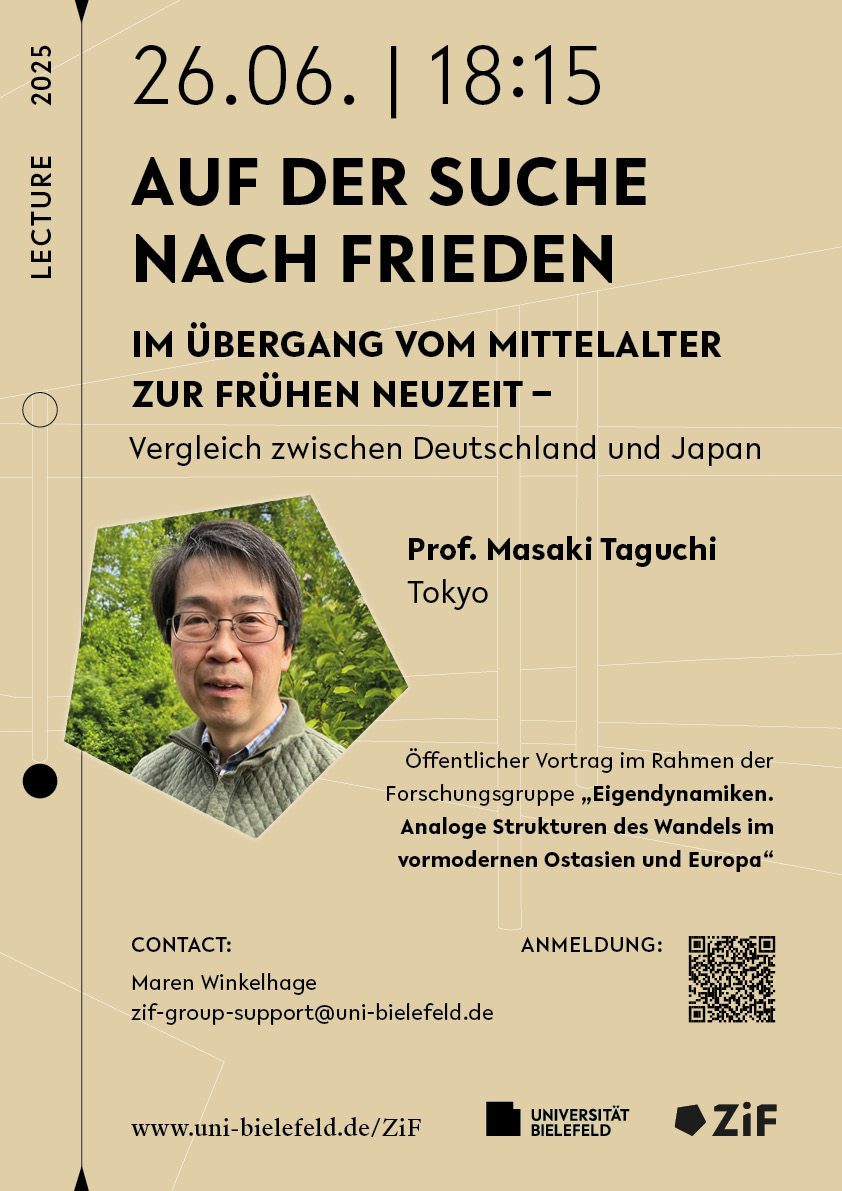
Masaki Taguchi (Tokyo): Auf der Suche nach Frieden im Übergang vom Mittelalter zur Frühen Neuzeit
Zentrum für interdisziplinäre Forschung (ZiF)Öffentlicher Vortrag im Rahmen der Forschungsgruppe "Eigendynamiken. Analoge Strukturen des Wandels im vormodernen Ostasien und Europa". Masaki Taguchi ist Professor für Rechtsgeschichte an der Juristischen Fakultät der Universität Tokio. Er forscht und lehrt regelmäßig als Gastprofessor in Deutschland, vor allem in Gießen und Freiburg. Für sein Werk „Königliche Gerichtsbarkeit und regionale Konfliktbeilegung im deutschen Spätmittelalter: […]
-
Masaki Taguchi (Tokyo): Auf der Suche nach Frieden im Übergang vom Mittelalter zur Frühen Neuzeit: Vergleich zwischen Deutschland und Japan
Zentrum für interdisziplinäre Forschung (ZiF)Vortrag im Rahmen des Kolloquiums Mittelalter und Frühe Neuzeit. Für Informationen zur Veranstaltung sowie Zoom-Zugangsdaten können sich Teilnahmeinteressierte per Mail an karen.gamm@uni-bielefeld.de wenden. Eine Auswahl an Vorträgen finden Sie auch auf unserem YouTube-Kanal: https://www.youtube.com/@UBVGeschichte
-
Mobility – Transformation – Narrative
Zentrum für interdisziplinäre Forschung (ZiF)Convenor: Carolin Gebauer (Wuppertal) The 17 Sustainable Development Goals outlined in the United Nations 2030 Agenda for Sustainable Development present scholars, scientists, and policymakers with a complex challenge that can only be met through interdisciplinary collaboration. This workshop brings together scholars from the fields of mobility studies, transformation studies, and narrative studies with the aim […]
-

3. TRR 318 Konferenz: Contextualizing Explanations (ContEx25)
Zentrum für interdisziplinäre Forschung (ZiF)Künstliche Intelligenz wird zunehmend in entscheidungskritischen Bereichen eingesetzt. Damit wächst die Notwendigkeit, Systeme transparenter zu gestalten und Nutzer*innen in die Lage zu versetzen, KI-Entscheidungen nachzuvollziehen, zu hinterfragen und gegebenenfalls zu steuern. Vor diesem Hintergrund stellt sich die Frage, wie Erklärungen von KI kontextualisiert werden können, sodass sie für Nutzer*innen relevant sind und ihre Entscheidungsfindung stärken. […]
Kostenlos